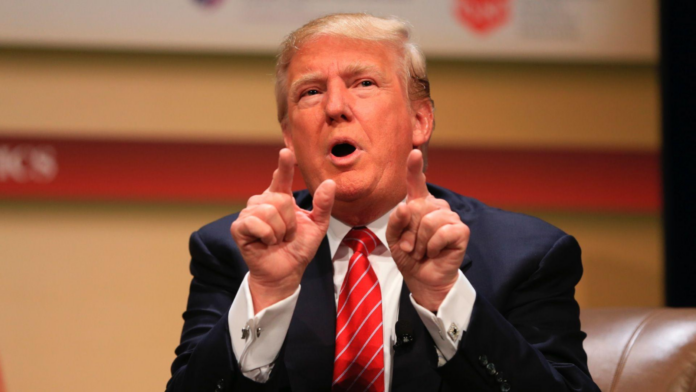In the bustling world of cryptocurrencies and digital finance, former U.S. President Donald Trump has made a striking declaration. Amid the clamor of his campaign trail in New Hampshire, Trump has taken a firm stance against the notion of a U.S. central bank digital currency (CBDC), categorizing it as a looming threat to the autonomy of American finances.
“Imagine a future where your financial liberty is just a memory, a digital currency governed entirely by the whims of the government,” Trump cautioned his audience. His words painted a vivid picture of a world where every dollar and cent is under the microscope of federal oversight. “As your President, the creation of a CBDC will be off the table – I vow to keep your money from falling into the absolute control of the government,” he pledged, his words resonating with a promise to guard Americans from what he termed as ‘government tyranny.’
But why such a strong opposition to a CBDC, you might ask? For Trump, the answer lies in the belief that a government-controlled digital currency could spell disaster for personal freedoms. The thought of the government having the power to ‘make your money vanish without a trace’ is a scenario Trump adamantly wants to prevent.
The former President’s stance marks a significant pivot in his relationship with the crypto world. Once a skeptic, Trump now seems to be aligning himself more closely with the pro-crypto camp, perhaps recognizing the growing influence of digital currencies in the financial sphere and their burgeoning appeal among voters. This shift was underscored by his appearance alongside Vivek Ramaswamy, a fellow crypto advocate and former presidential candidate, who stepped down from the race to support Trump following the Iowa caucuses.
Adding to the intrigue, Trump has dabbled in the crypto space himself, launching several NFT collections and reportedly cashing out a handsome sum in Ethereum from these ventures. This move into the digital art world might be seen as an ironic twist, given his previous reservations about cryptocurrencies.
The debate over a U.S. CBDC isn’t confined to Trump’s campaign, though. The issue has become a hot topic among presidential hopefuls, with Ron DeSantis, Governor of Florida and a contender for the Republican nomination, also making bold proclamations. DeSantis has been vocal about his intention to “end Biden’s war on Bitcoin,” and has already banned CBDCs in Florida, even going as far as to introduce Bitcoin as a payment option for state taxes for businesses.
These developments highlight a growing trend in political circles, where digital currencies and blockchain technology are no longer fringe topics but central elements of campaign platforms. The intersection of politics and digital finance is becoming increasingly pronounced, making the 2024 election a potential turning point for the future of cryptocurrencies in the U.S.
As the campaign season heats up, the crypto community and financial technology enthusiasts are keeping a keen eye on these unfolding narratives. The potential implications of a U.S. CBDC – or the lack thereof – are vast, affecting everything from personal financial freedom to the broader landscape of the global financial system. With figures like Trump and DeSantis shaping their campaigns around these issues, the stage is set for an election where digital currency policies could be a decisive factor.
In conclusion, Trump’s vow against a U.S. CBDC reflects a larger conversation about financial autonomy and the role of government in the burgeoning world of digital currencies. Whether his stance will resonate with voters and influence the future of U.S. financial policy remains to be seen. As the 2024 election approaches, one thing is certain: the debate over digital currencies is no longer just a matter of economics; it’s a question of freedom and control in the digital age.















